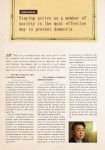
0000288002 2 / 27
10秒後にBOOKのページに移動します
─ How did you get your start in the fi eld of dementia? Around the time I finished university studies and became a resident, I developed an interest in neurology and wanted to go into that fi eld to study Parkinson's disease, but in the end I went into general internal medicine instead. During my first year of graduate school, I approached Doctor Kenji Kosaka.the psychiatrist who discovered dementia with Lewy bodies [DLB].to ask if I could study under him. Later on, Doctor Kosaka told me to create a comprehensive DLB medical center that handles everything from initial examinations through to treatment, so I transferred to the Yokohamashintoshi Neurosurgical Hospital and established the Internal Medicine and Dementia Diagnosis Center, known as "Forgetfulness Clinic." I am truly grateful that I was given this opportunity. ─ Are numbers of dementia patients increasing? As we grow older, we tend to become more forgetful, which is sometimes a sign of Alzheimer's disease. In some cases, it's possible to minimize the eff ects of the disease if the symptoms are spotted early. That's why it's important to undergo examinations rather than making arbitrary excuses, such as blaming it on old age. When those types of patients are factored in, I believe there would be more than 4.62 million dementia patients. In regions with large elderly populations, about 80% of patients who received memory-related health checkups [to confirm brain and memory functions] were told to come in again for further testing. Not all cases are Alzheimer's, and in addition to patients clearly suffering from some form of dementia, some have mild cognitive impairment, or MCI, that serves as a precursor to dementia. Only about 10% to 20% of patients fi nish these examinations without any signs of dementia. As our lifespans grow longer, dementia numbers increase overall. Many believe that DLB is increasing in prominence, but that's only because we have become more capable of detecting it. "Dementia" refers not to a specifi c disease, but to a pathology, and encompasses various brain diseases including Alzheimer's, DLB, and other disorders with differing causes. Doctors at smaller, local clinics have become much more knowledgeable about these things and now write specifi c disease names on patient referral forms, but experts at larger institutions, myself included, carry a lot of the responsibility. I feel that our efforts to spread knowledge and awareness in this field, centering on Doctor Kosaka, have really paid off . There are no standard drugs that can be used to treat the estimated 4.62 million people afflicted with dementia, which is why preventive measures are so important. We talked with Professor Yuta Manabe, who is involved in joint dementia prevention efforts together with dentistry professionals, about how to deal with dementia as a part of one's life. Staying active as a member of society is the most effective way to prevent dementia 2